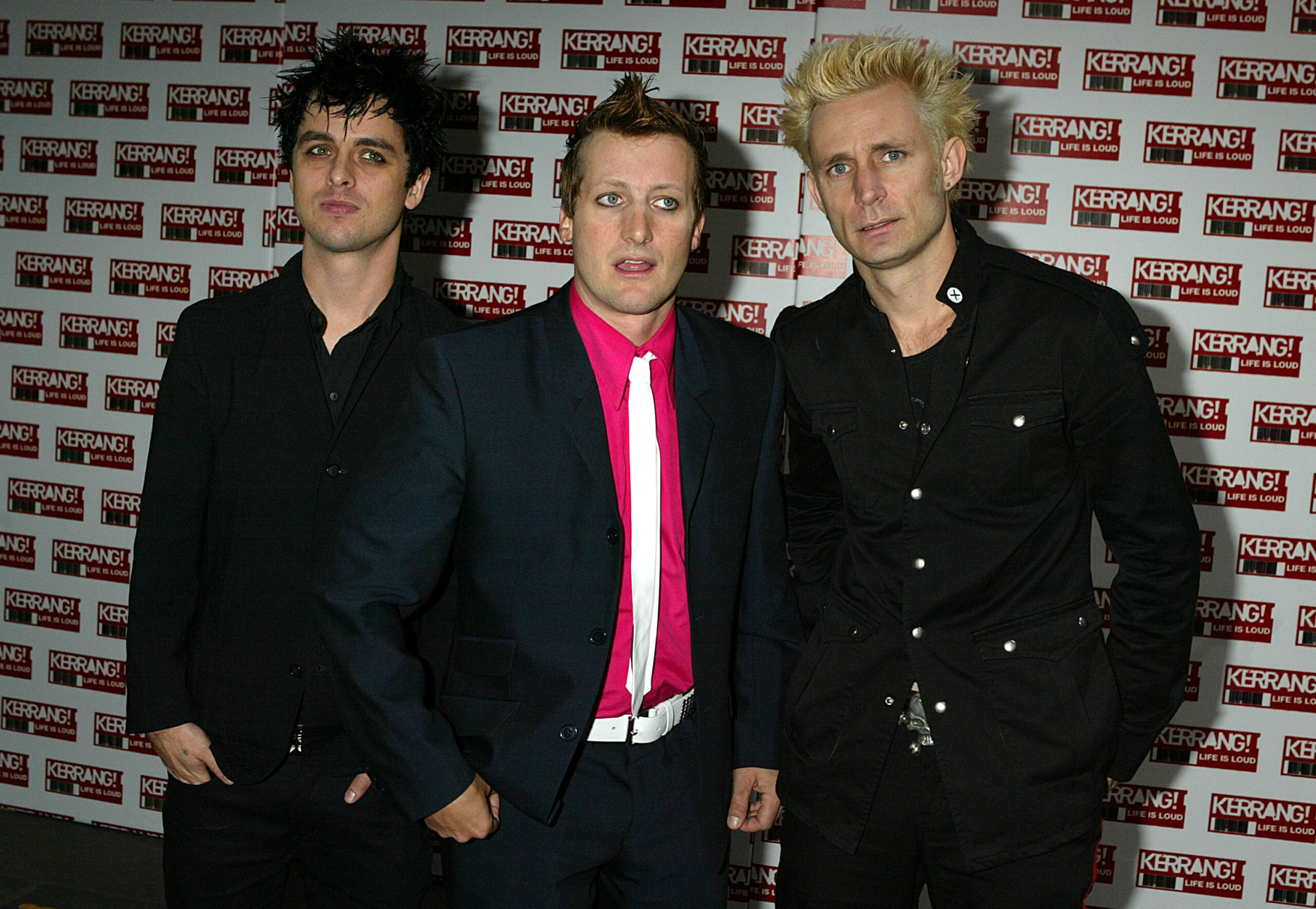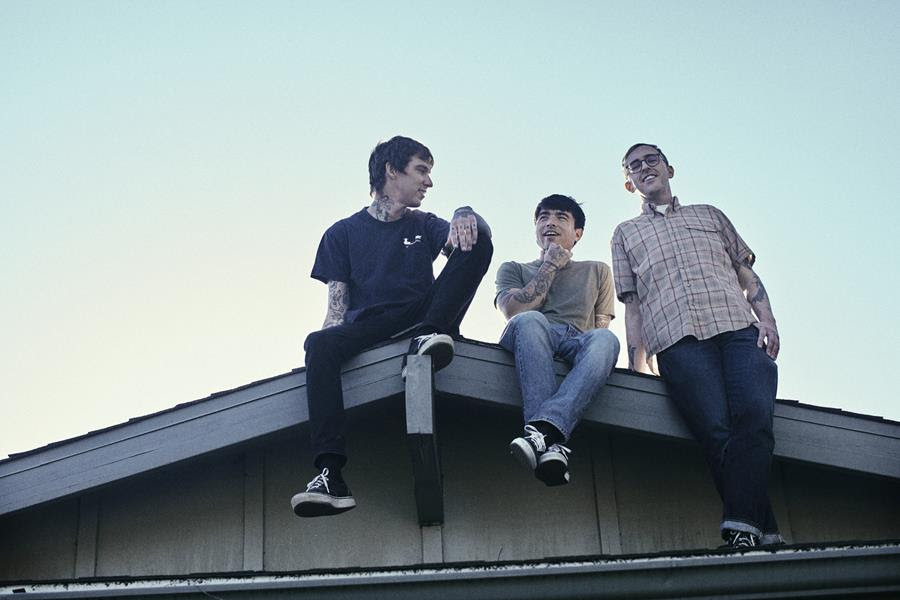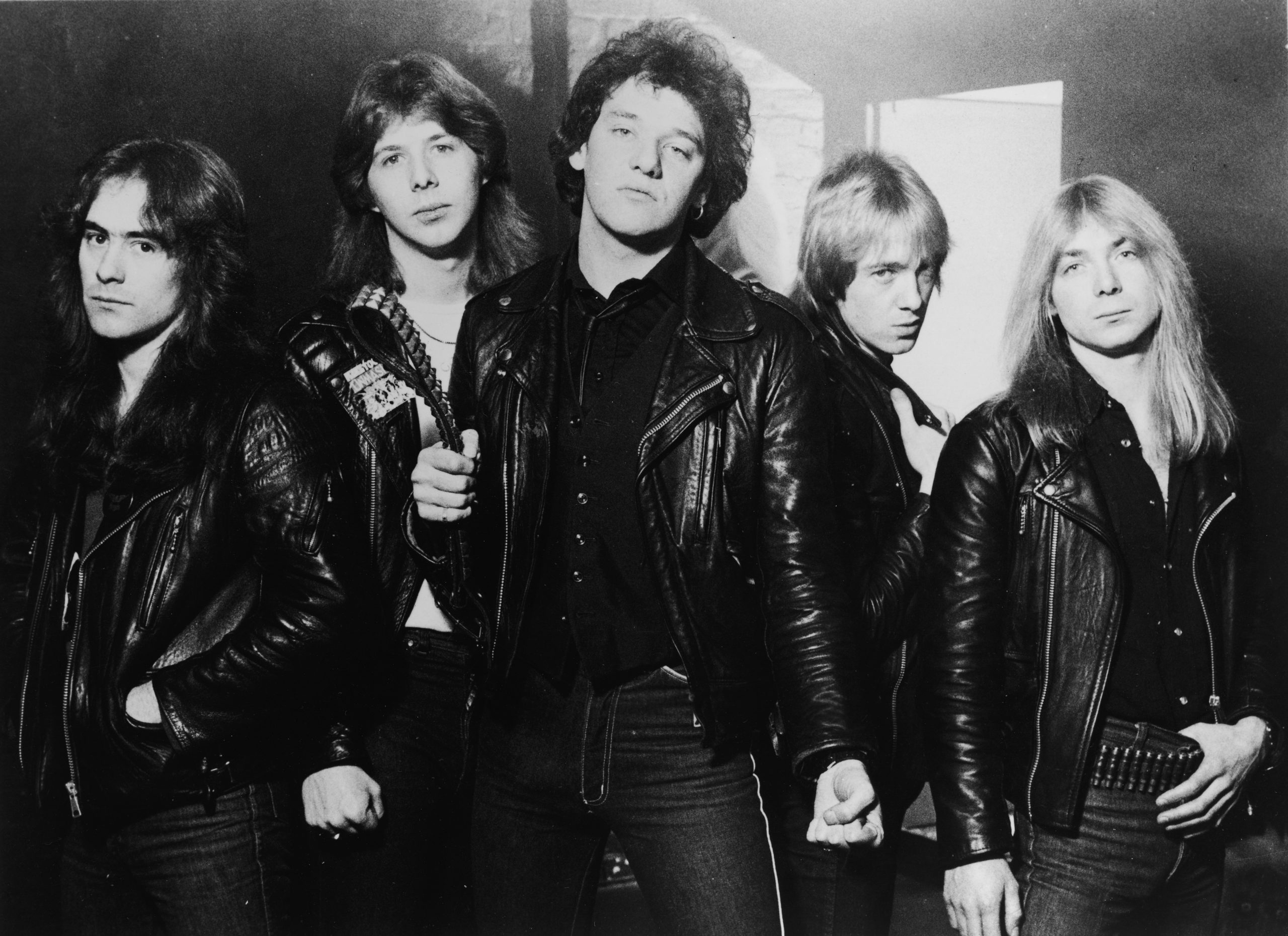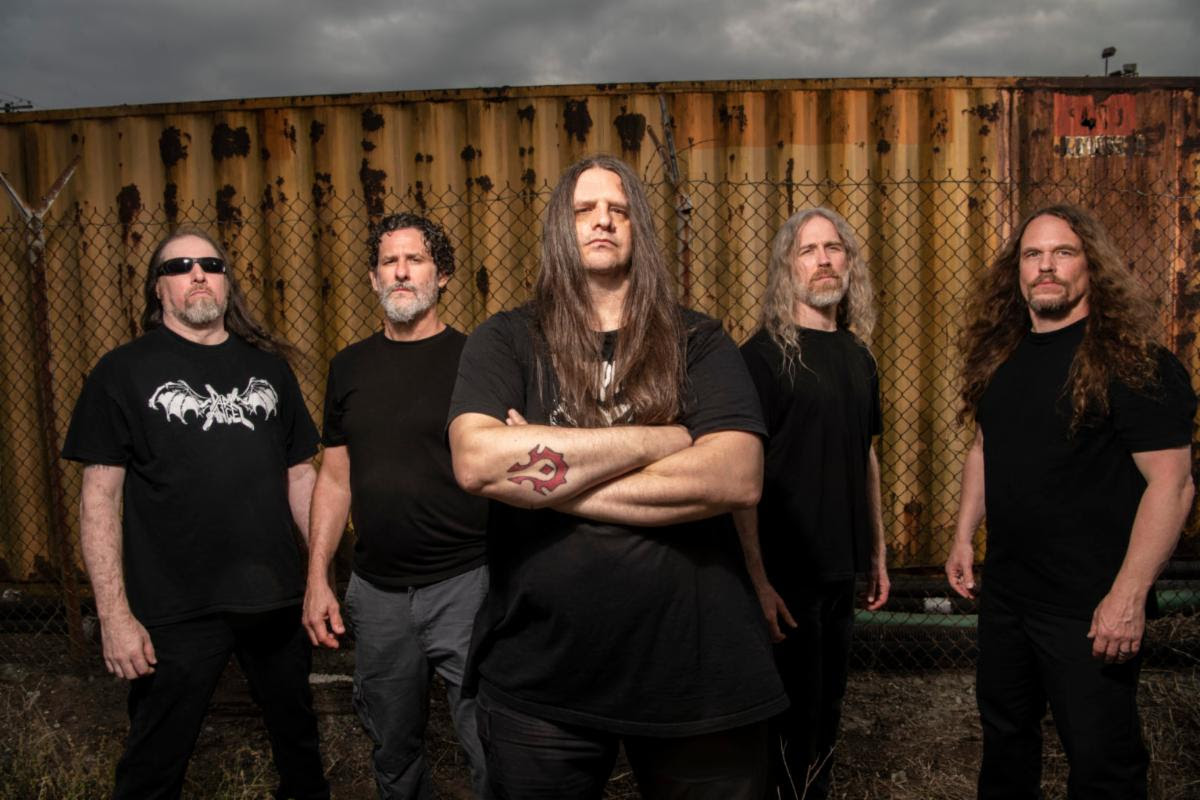All Built To Spill songs exist on a continuum between two poles: snappy, twee-inflected pop songs and vast, mind-altering classic rock soundscapes. I've never been to Idaho, but I can't help wondering if this reflects the topography there, the concrete quadrants of a busy Boise business district giving way to resplendent unmarred mountain ranges and infinite sky.
You can spend a lot of time alone with your thoughts in a place like that, and Doug Martsch undoubtedly does. Built To Spill lyrics tend to map the former Treepeople frontman’s inner monologue, from cynical waking-life reflections to longing glimpses into dreams. (So many dreams! I sometimes get the sense that, given the chance to exist forever in subconscious limbo like Marion Cotillard in Inception, Martsch would do it in an instant.) It’s easy to imagine him muttering many of his lyrics under his breath. Whether dealing in transcendental imagery or detail-rich true-life frustrations, he contributed some of his genre’s most evocative and affecting turns of phrase, from "In America, every puddle a gasoline rainbow" to "Thought it was an alien/ Turned out to be just God." Even the ostensibly comedic lines ("My stepfather looks just like David Bowie/ But he hates David Bowie") are contagiously thoughtful.
But Martsch is best known for his guitar work, and rightfully so; a nasal whine wasn’t all he inherited from Neil Young. Whether couched in low-budget crackle or gleaming crystalline sighs, Built To Spill’s six-string theatrics have always been astonishing. With the help of his rotating crew of old friends and collaborators — it’s hard to keep track when one guy is named Brett Nelson and another is Brett Netson, and both have been through the revolving door a couple times — Martsch dispelled the notions that (a) indie rock is only for those without chops and (b) guitar solos are only for the Sam Ash soul patch set. Pavement and Guided By Voices were closer to the platonic ideal of a ’90s indie band, but at the height of their powers, Built To Spill became what Television was for the ’70s and Dinosaur Jr. was for the ’80s: the surest pathway from a classic rock record collection to a vast world of eccentric underground sound.
As Martsch and his cohorts mellowed out and aged out of fashion, Built To Spill slowed down to the point that it wasn’t surprising when news of a hiatus broke last month. Nor was it all that shocking to read about Martsch suffering from a depressing case of writer’s block; Built To Spill’s second decade found him more or less wringing his muse dry, returning to music only when he got bored of basketball. Regarding a scrapped attempt at a new album, Martsch told Pitchfork, "The songs were pretty good and I thought those guys did a great job, but I had zero eureka moments. I had no just even happy moments. I was a little bit worried about myself -- it’s harder getting older, thinking maybe I’ve run my course. I was happy to bag that record."
If Built To Spill has indeed come to a close, they leave behind a marvelous body of work. It began in in earnest 20 years ago today with the release of the debut album Ultimate Alternative Wavers. What followed wasn’t prolific by Bob Pollard standards or even Stephen Malkmus standards, but Martsch’s output these last two decades has been generous enough to produce six more studio LPs plus numerous essential full-lengths that are impossible to compare: the early singles collection The Normal Years; Martsch’s acoustic-heavy solo album Now You Know; the concert album Live. No matter how you like them apples, they aren’t congruent with these oranges. Thus, here are Built To Spill’s seven studio albums ranked, recounted and (mostly) revered.

7. Ancient Melodies Of The Future (2001)
"Strange" is a wonderful song — so much glorious noise weaves in and out of its simplistic chord changes — but the opener’s ambling approach suggests Ancient Melodies Of The Future will be significantly less ambitious than the powerhouse trio of LPs that preceded it. The rest of the record bears that out. Built To Spill keeps laying the textural tricks on thick, but no amount of window fog can obscure the B-side quality of most tracks here. Very few of the gauzy song-smears that comprise the bulk of the tracklist are outright bad, but their combined effect is the type of fatigue that comes from too much sleep. When they do crank up the energy, as on "Happiness" and the obnoxiously catchy "Fly Around My Pretty Little Miss," the late-’90s alternative radio summer jam pep is whiplash-inducing. And it’s a shame they squandered a genius line like "As long as it’s talking with you/ Talk of the weather will do" on a dud like "The Weather," but considering the subject matter, maybe mundane was the point.7. Ancient Melodies Of The Future (2001)
"Strange" is a wonderful song — so much glorious noise weaves in and out of its simplistic chord changes — but the opener’s ambling approach suggests Ancient Melodies Of The Future will be significantly less ambitious than the powerhouse trio of LPs that preceded it. The rest of the record bears that out. Built To Spill keeps laying the textural tricks on thick, but no amount of window fog can obscure the B-side quality of most tracks here. Very few of the gauzy song-smears that comprise the bulk of the tracklist are outright bad, but their combined effect is the type of fatigue that comes from too much sleep. When they do crank up the energy, as on "Happiness" and the obnoxiously catchy "Fly Around My Pretty Little Miss," the late-’90s alternative radio summer jam pep is whiplash-inducing. And it’s a shame they squandered a genius line like "As long as it’s talking with you/ Talk of the weather will do" on a dud like "The Weather," but considering the subject matter, maybe mundane was the point.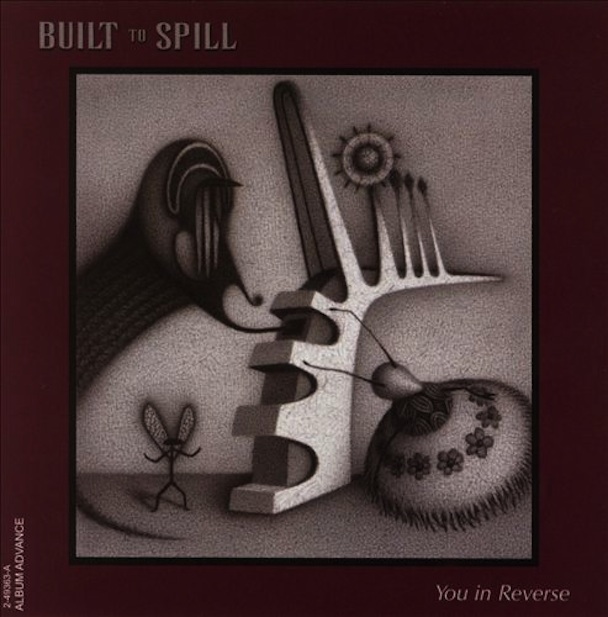
6. You In Reverse (2006)
The longest gap between Built To Spill albums is the half-decade gulf that separates 2001’s Ancient Melodies Of The Future from 2006’s You In Reverse. Largely thanks to Reverse’s brisk, bruising, Wipers-inspired lead single "Goin’ Against Your Mind," it was hailed as a return to form, a palate cleanser for the bad taste of its complacent predecessor. About half the time, You In Reverse plays like the comeback album it was purported to be, especially the stretched-out Dinosaur fuzz-bombing of "Conventional Wisdom," the multifarious organ romp "Gone," and the nightfall/daybreak of closing tandem "Just A Habit" and "The Wait." But half of it plays like Built To Spill fans jamming in a basement; they get the sonic signifiers right, but inspiration and direction are lacking. Given that the record actually was born from jamming, it’s a good thing Martsch went back to writing alone for 2009’s There Is No Enemy. The name-appropriate backsliding of You In Reverse is proof enough that — creatively, at least — Martsch is better as an auteur than a team player.6. You In Reverse (2006)
The longest gap between Built To Spill albums is the half-decade gulf that separates 2001’s Ancient Melodies Of The Future from 2006’s You In Reverse. Largely thanks to Reverse’s brisk, bruising, Wipers-inspired lead single "Goin’ Against Your Mind," it was hailed as a return to form, a palate cleanser for the bad taste of its complacent predecessor. About half the time, You In Reverse plays like the comeback album it was purported to be, especially the stretched-out Dinosaur fuzz-bombing of "Conventional Wisdom," the multifarious organ romp "Gone," and the nightfall/daybreak of closing tandem "Just A Habit" and "The Wait." But half of it plays like Built To Spill fans jamming in a basement; they get the sonic signifiers right, but inspiration and direction are lacking. Given that the record actually was born from jamming, it’s a good thing Martsch went back to writing alone for 2009’s There Is No Enemy. The name-appropriate backsliding of You In Reverse is proof enough that — creatively, at least — Martsch is better as an auteur than a team player.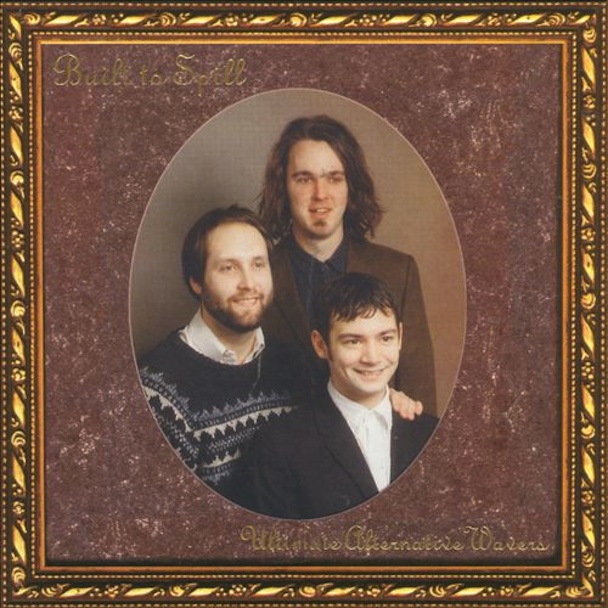
5. Ultimate Alternative Wavers (1993)
The cover of Ultimate Alternative Wavers depicts Built To Spill in an awkward family photo, the kind of ironic gesture that would come to define the idea of indie rock for those on the outside looking in. It’s appropriate, then, that the music inside is a passable blueprint for a genre that was still narrow enough to be defined. Ultimate Alternative Wavers is not a watershed moment like Pavement’s Slanted And Enchanted, but it’s definitely a passable artifact for anybody seeking to understand the insular realm of indie rock circa 1993, a world of slipshod guitar songs sung by whimsical weirdos. The record is very much a product of its influences: slicing, post-Mascis guitar solos; Malkmus-style vocal tomfoolery ("La la la la la"); Sonic Youth-informed noise swashes; the childlike affectation of K Records, the label founded by Martsch’s Halo Benders bandmate Calvin Johnson. Sometimes it’s almost a caricature of an indie rock album; the underachieving "slacker" archetype gets his tribute on "Nowhere Nothin’ Fuckup," while the shoddy songwriting and even shoddier production of "Revolution" is fodder for anyone arguing the case that bands signed to indie labels because they couldn’t cut it in the big leagues. Yet for all its flaws, Wavers never wavers in its vision. It presents a songwriter stepping into a distinct identity that would survive through many moods, collaborators and production styles.5. Ultimate Alternative Wavers (1993)
The cover of Ultimate Alternative Wavers depicts Built To Spill in an awkward family photo, the kind of ironic gesture that would come to define the idea of indie rock for those on the outside looking in. It’s appropriate, then, that the music inside is a passable blueprint for a genre that was still narrow enough to be defined. Ultimate Alternative Wavers is not a watershed moment like Pavement’s Slanted And Enchanted, but it’s definitely a passable artifact for anybody seeking to understand the insular realm of indie rock circa 1993, a world of slipshod guitar songs sung by whimsical weirdos. The record is very much a product of its influences: slicing, post-Mascis guitar solos; Malkmus-style vocal tomfoolery ("La la la la la"); Sonic Youth-informed noise swashes; the childlike affectation of K Records, the label founded by Martsch’s Halo Benders bandmate Calvin Johnson. Sometimes it’s almost a caricature of an indie rock album; the underachieving "slacker" archetype gets his tribute on "Nowhere Nothin’ Fuckup," while the shoddy songwriting and even shoddier production of "Revolution" is fodder for anyone arguing the case that bands signed to indie labels because they couldn’t cut it in the big leagues. Yet for all its flaws, Wavers never wavers in its vision. It presents a songwriter stepping into a distinct identity that would survive through many moods, collaborators and production styles.
4. There Is No Enemy (2009)
Melancholy hangs over every Built To Spill album, but There Is No Enemy is tonally darker and heavier than most. Even at its most sprightly (the skipping, shimmering "Good Ol’ Boredom"; the rocket-launched "Pat"; the propulsive career highlight "Aisle 13") the record feels like twilight, and as of this writing that’s what it represents for Built To Spill. A sense of defeat and disappointment prevails; 1993’s anxiously expectant "Once in awhile there’s this girl I don’t know in my dreams" has soured into 2009’s disillusioned "Stay out of my nightmares, stay out of my dreams/ You’re not even welcome in my memories." That’s unfortunate, partially because it hurts to hear Martsch getting nowhere with his existential grappling, partially because in terms of artistry, There Is No Enemy is a low-key triumph. The arrangements show the savvy of old pros, from country ballads laced with lush brass, violin and pedal steel to the saturated-spongy psych dirge "Oh Yeah." Lyrically, Martsch has never been sharper, spinning memorable lines with simplicity and economy to match the music, accepting open-ended conclusions from the cosmos ("Every day something strange I can’t explain happens to me") and protesting them from human beings ("All I want is you to make up your mind"). It’s a deceptively humble record that reveals its grandeur slowly with the years. If this is the final Built To Spill LP, Martsch can ride into the Idaho sunset ... if not satisfied, at least proud.4. There Is No Enemy (2009)
Melancholy hangs over every Built To Spill album, but There Is No Enemy is tonally darker and heavier than most. Even at its most sprightly (the skipping, shimmering "Good Ol’ Boredom"; the rocket-launched "Pat"; the propulsive career highlight "Aisle 13") the record feels like twilight, and as of this writing that’s what it represents for Built To Spill. A sense of defeat and disappointment prevails; 1993’s anxiously expectant "Once in awhile there’s this girl I don’t know in my dreams" has soured into 2009’s disillusioned "Stay out of my nightmares, stay out of my dreams/ You’re not even welcome in my memories." That’s unfortunate, partially because it hurts to hear Martsch getting nowhere with his existential grappling, partially because in terms of artistry, There Is No Enemy is a low-key triumph. The arrangements show the savvy of old pros, from country ballads laced with lush brass, violin and pedal steel to the saturated-spongy psych dirge "Oh Yeah." Lyrically, Martsch has never been sharper, spinning memorable lines with simplicity and economy to match the music, accepting open-ended conclusions from the cosmos ("Every day something strange I can’t explain happens to me") and protesting them from human beings ("All I want is you to make up your mind"). It’s a deceptively humble record that reveals its grandeur slowly with the years. If this is the final Built To Spill LP, Martsch can ride into the Idaho sunset ... if not satisfied, at least proud.
3. There’s Nothing Wrong With Love (1994)
Built To Spill released some 7-inches and the early singles collection The Normal Years on indie-pop standard bearer K Records, but the band was never more twee than on There’s Nothing Wrong With Love, their second full-length and first genuinely great record. It’s a charmingly sophomoric sophomore release, fraught with wide-eyed childlike yearning ("Reasons," "Twin Falls"), cutesy spunk ("Big Dipper," "In The Morning") and juvenile pranks (the wonderfully goofy secret track "Preview," still good for a laugh after all these years). Martsch never sang a more indelible line than the climactic "Car" coda "I wanna see movies of my dreams," and the pogo-a-gogo chorus of "Dystopian Dream Girl" is one for the ages. The guitar parts throughout are playful and spontaneous, and the songs often veer off into delightful surprise turns. So 19-year-old me struggles to understand how it didn’t come in first place on this Countdown. Trouble is, 29-year-old me finds the record’s lesser segments excruciating. "Fling" comes off like a pre-Bends Radiohead B-side, replete with uncomfortable over-sharing ("It takes me a long time to cum to the memory of us.") Lyrics like "Wiggly days, wiggly nights" and Martsch’s arrested-development vocal render "Cleo" an intolerably cutesy lullaby from the womb. The dynamic shifts on "Some" ("One guy I know thinks he’s hard to get along with/ BUT A LOT OF PEOPLE THINK HE’S FINE!") are either awkward or awesome depending on whether Martsch is joking. Still, it’s hard not to appreciate the self-awareness of lyrics like "I wrote a song/ It was slow and long/ I wrote the words and music wrong/ But life goes on." Despite a few moments when the endearing tips over into the obnoxious, There’s Nothing Wrong With Love is the sound of scrappy mountain manchildren toying with their powers, pushing the limits of their form, setting the table for future tours de force.3. There’s Nothing Wrong With Love (1994)
Built To Spill released some 7-inches and the early singles collection The Normal Years on indie-pop standard bearer K Records, but the band was never more twee than on There’s Nothing Wrong With Love, their second full-length and first genuinely great record. It’s a charmingly sophomoric sophomore release, fraught with wide-eyed childlike yearning ("Reasons," "Twin Falls"), cutesy spunk ("Big Dipper," "In The Morning") and juvenile pranks (the wonderfully goofy secret track "Preview," still good for a laugh after all these years). Martsch never sang a more indelible line than the climactic "Car" coda "I wanna see movies of my dreams," and the pogo-a-gogo chorus of "Dystopian Dream Girl" is one for the ages. The guitar parts throughout are playful and spontaneous, and the songs often veer off into delightful surprise turns. So 19-year-old me struggles to understand how it didn’t come in first place on this Countdown. Trouble is, 29-year-old me finds the record’s lesser segments excruciating. "Fling" comes off like a pre-Bends Radiohead B-side, replete with uncomfortable over-sharing ("It takes me a long time to cum to the memory of us.") Lyrics like "Wiggly days, wiggly nights" and Martsch’s arrested-development vocal render "Cleo" an intolerably cutesy lullaby from the womb. The dynamic shifts on "Some" ("One guy I know thinks he’s hard to get along with/ BUT A LOT OF PEOPLE THINK HE’S FINE!") are either awkward or awesome depending on whether Martsch is joking. Still, it’s hard not to appreciate the self-awareness of lyrics like "I wrote a song/ It was slow and long/ I wrote the words and music wrong/ But life goes on." Despite a few moments when the endearing tips over into the obnoxious, There’s Nothing Wrong With Love is the sound of scrappy mountain manchildren toying with their powers, pushing the limits of their form, setting the table for future tours de force.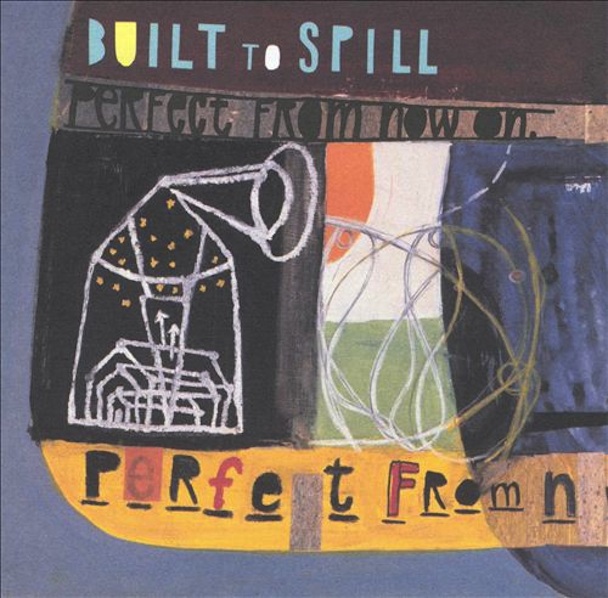
2. Perfect From Now On (1997)
The secret track on 1994’s There’s Nothing Wrong With Love is a mock preview of the next Built To Spill album with snippets from fake songs that show BTS branching out into new sounds like saccharine pop-punk and hokey country balladry before a cartoonish voice announces, "Look for the record with me on the cover!" It was a lark, but when Perfect From Now On emerged in early 1997, the change was almost as radical and far more exhilarating. Being an underground guitar band with ties to Seattle, Built To Spill had of course signed to Warner Bros. during the post-Nirvana alternative cash-grab, and that major label money was well spent. From the first floating notes of "Randy Described Eternity," it’s clear Perfect From Now On marks a major sonic upgrade. It’s also a quantum leap in terms of ambition. Martsch had attempted epics before, but never such proggy epics. The Crazy Horse disciple was on his Floyd shit, tracing existential orbits to infinity without compromising the craftsmanship that guided his compact pop songs. These eight spectral sprawls are Built To Spill at their most cosmic; imagery and sounds alike evoke space, God, and forever. Yet the concerns remain distinctly earthbound — bullshitting about your dreams, seething at minor annoyances, depending on your mother to see something special in you. It’s such an odd opus, thrilling to behold but surprisingly oblique compared to the albums on either side of it. When you’re not mentally locked in, it sometimes seems to go on and on and on and on and on and on. But Perfect From Now On rewards mesmerized observation on the level of the slavish devotion that spawned it.2. Perfect From Now On (1997)
The secret track on 1994’s There’s Nothing Wrong With Love is a mock preview of the next Built To Spill album with snippets from fake songs that show BTS branching out into new sounds like saccharine pop-punk and hokey country balladry before a cartoonish voice announces, "Look for the record with me on the cover!" It was a lark, but when Perfect From Now On emerged in early 1997, the change was almost as radical and far more exhilarating. Being an underground guitar band with ties to Seattle, Built To Spill had of course signed to Warner Bros. during the post-Nirvana alternative cash-grab, and that major label money was well spent. From the first floating notes of "Randy Described Eternity," it’s clear Perfect From Now On marks a major sonic upgrade. It’s also a quantum leap in terms of ambition. Martsch had attempted epics before, but never such proggy epics. The Crazy Horse disciple was on his Floyd shit, tracing existential orbits to infinity without compromising the craftsmanship that guided his compact pop songs. These eight spectral sprawls are Built To Spill at their most cosmic; imagery and sounds alike evoke space, God, and forever. Yet the concerns remain distinctly earthbound — bullshitting about your dreams, seething at minor annoyances, depending on your mother to see something special in you. It’s such an odd opus, thrilling to behold but surprisingly oblique compared to the albums on either side of it. When you’re not mentally locked in, it sometimes seems to go on and on and on and on and on and on. But Perfect From Now On rewards mesmerized observation on the level of the slavish devotion that spawned it.
1. Keep It Like a Secret (1999)
Having established their bona fides as punchy pop songwriters on 1994’s There’s Nothing Wrong With Love and widescreen visionaries on 1997’s Perfect From Now On, Martsch and his mates sought to synthesize those strengths. It worked. Keep It Like a Secret is Built To Spill’s shining moment, when everything great about the group comes together in HD. The sheer quantity of "holy shit" moments on this record rapidly becomes overwhelming in that euphoric, can’t-stop-smiling sense. "The Plan" drops in like a plummeting elevator, blasts back through the ceiling, sprouts a parachute and glides gracefully to ground. "Center Of The Universe" rides a guitar part so giddy it’s almost goofy. Amidst the intensifying guitar waterfalls that propel "Carry The Zero," Martsch’s arching whine piles on iconic lyrics till the levee breaks. ("You have become/ What you thought was dumb/ A fraction of the sum!") The album could end there and easily go down as the grand finale of ’90s guitar rock, but its pleasures continue to unfurl. "Time Trap" is multi-segmented mid-tempo manna. "Temporarily Blind" is the most gorgeous music they ever recorded, "Broken Chairs" the most brutal. And "You Were Right" just might be the pinnacle of all things Built To Spill: subverting and worshipping classic rock in word and deed, riding righteous guitar riffs into the horizon, lungs lifting the weight of the world to the edge of the stratosphere.1. Keep It Like a Secret (1999)
Having established their bona fides as punchy pop songwriters on 1994’s There’s Nothing Wrong With Love and widescreen visionaries on 1997’s Perfect From Now On, Martsch and his mates sought to synthesize those strengths. It worked. Keep It Like a Secret is Built To Spill’s shining moment, when everything great about the group comes together in HD. The sheer quantity of "holy shit" moments on this record rapidly becomes overwhelming in that euphoric, can’t-stop-smiling sense. "The Plan" drops in like a plummeting elevator, blasts back through the ceiling, sprouts a parachute and glides gracefully to ground. "Center Of The Universe" rides a guitar part so giddy it’s almost goofy. Amidst the intensifying guitar waterfalls that propel "Carry The Zero," Martsch’s arching whine piles on iconic lyrics till the levee breaks. ("You have become/ What you thought was dumb/ A fraction of the sum!") The album could end there and easily go down as the grand finale of ’90s guitar rock, but its pleasures continue to unfurl. "Time Trap" is multi-segmented mid-tempo manna. "Temporarily Blind" is the most gorgeous music they ever recorded, "Broken Chairs" the most brutal. And "You Were Right" just might be the pinnacle of all things Built To Spill: subverting and worshipping classic rock in word and deed, riding righteous guitar riffs into the horizon, lungs lifting the weight of the world to the edge of the stratosphere.

